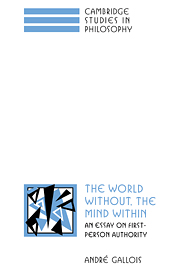Book contents
4 - Defending the basic account
Published online by Cambridge University Press: 23 January 2010
Summary
If instances of the doxastic schema are valid the move from p to ‘I believe p’ is warranted. Are instances of the doxastic schema valid? Are they properly called inferences? Having concluded that whales are mammals, it is, ceteris paribus, rational for me to conclude that I believe they are. Why is it rational for me to so conclude? In order to approach an answer to this question I will attempt to answer a different one. What is the function of our ability to attribute beliefs? In what way would we be disadvantaged if we lacked that ability?
Philosophers have almost exclusively focused on a particular answer to this last question. Employing the concept of belief has considerable explanatory utility. If one wishes to explain, or anticipate, the behaviour of another, it is well to find out what that person believes. In giving this answer we are adopting a third-person perspective. Attributing beliefs has utility insofar as doing so helps to explain the behaviour of others. I wish to give an account of the function of our concept of belief which shifts emphasis to the first-person perspective.
From that perspective how would it be if one lacked the ability to attribute to oneself beliefs, thoughts, suppositions, conjectures and the like except on the basis of evidence? We are considering someone who has the concept of belief, and is still able to rationally form and revise beliefs. It is just that she is unable to form justified second-order beliefs without consulting her behaviour. We are considering someone whom Sydney Shoemaker calls a self-blind individual.
Information
- Type
- Chapter
- Information
- The World Without, the Mind WithinAn Essay on First-Person Authority, pp. 64 - 83Publisher: Cambridge University PressPrint publication year: 1996
